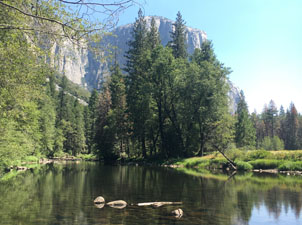
Caring For All of God’s Creation
By Shantha Ready Alonso
From NETWORK’s Catholic Social Justice Reflection Guide
I find it profound to worship a God who revels in the knowledge that the diversity of creation is very good. Beginning in the book of Genesis, we learn of a Creator who finds joy in difference – distinguishing land from water, forming a variety of plants and creatures, and calling forth humans of different genders, many colors and various creeds.
In Laudato Si’, Pope Francis introduces to us the concept of integral ecology, which expands our concept of what is included when we think of “God’s creation.” Creation not only encompasses the natural world, but also everything we co-create with God: built environments, economies, political systems, currencies, cuisines, languages, and music. From an integral ecology perspective, care for God’s creation means caring for the whole inhabited earth, and the cosmos beyond.
As people living in the United States, one way to delve into caring for creation is through our vast system of public lands: national parks, forests, monuments, refuges, sanctuaries and wilderness areas. Together, we the people collectively share responsibility for stewardship of these public lands. Through this system, together we can conserve our spiritual, natural, historical, and cultural heritage.
The heritage preserved in our public lands is something we can all treasure. But, our nation’s racist history of forced removal of people from land, confinement to reservations, segregation, discrimination, and unfair or forced labor practices has left a painful legacy – even in our public lands system. Likewise, our nation’s history of low regard for threatened and endangered species needs to be overcome by greater care. We have work to do to ensure our public lands belong to all of God’s creation.
Recently, the values of cultural and bio-diversity have become more prominent in our public lands and waters system. In the past five years, we have seen more and more monument designations that honor social justice leaders of courage, including the Cesar Chavez National Monument in California, the Harriet Tubman Underground Railroad National Monument in Maryland, and the Belmont-Paul Women’s Equality National Monument in Washington DC. For the first time in our history, the public lands system has a national monument with a focus on Native American heritage: Bears Ears National Monument. This 1.35 acres of land in Utah is sacred to multiple tribes, and through this monument, we can all benefit from the wisdom of the tribes that claim Bears Ears as their ancestral land.
Our public lands and waters tell our stories and shape our collective memory. They are places where we learn, play, and pray. We all depend on the integrity of God’s creation, which brings us together. All of us want clean air, water, and land for ourselves and our families. May we treasure the earth and these places of beauty that reveal the wonders of our Creator. In reflecting on the importance and sacredness of the earth, may we understand that it is a lens for us to see our interconnectedness and to celebrate our diversity.
Shantha Ready Alonso is the Executive Director of Creation Justice Ministries, which represents the creation care and environmental justice policies of major Christian denominations throughout the United States. Read more about their work at http://www.creationjustice.org.







